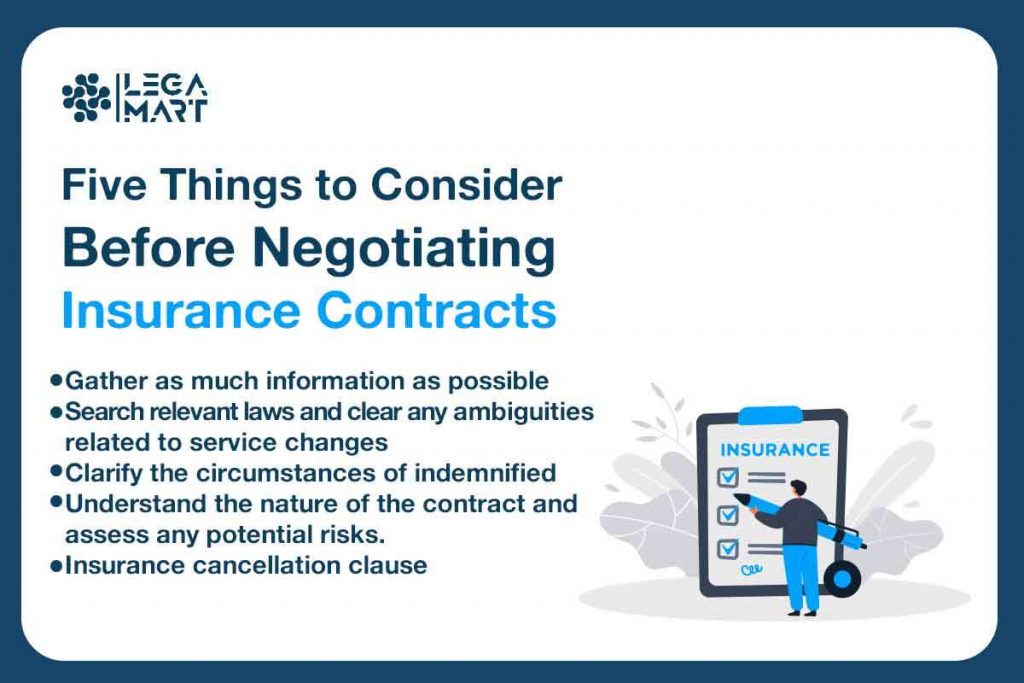Before jumping into the five things to consider before negotiating insurance contracts, you need to know what contract negotiation is. Contract negotiation is the process by which two or more parties discuss the terms of a contract to reach an agreement before signing and making it official.
During the contract negotiation process, all parties will evaluate their responsibilities, the benefits they can expect from the contract, and any risks they accept. The goal of contract negotiation is for all parties to be at ease with the contract’s details. Contracts legally bind you, so to avoid any inconsistencies in the future, it is recommended to conclude your contracts with the help of lawyers.
Things to consider before negotiating insurance contracts

Among many things you need to consider before negotiating an insurance contract, you first need to gather as much information as possible.
Knowledge is power, so get it.
Throughout the negotiation process, ask questions and gather as much relevant information as possible. You must have enough information to set aggressive, realistic goals and to evaluate the goals of the opposing party. You have the power with this information in your pocket. You will be scrambling if you do not have it. For example, suppose you are negotiating your medical insurance contract, you need to have the following information.
To negotiate a stable and effective contract, always devote time and effort to researching the healthcare strategies the company intends to implement in your community. You must review both the health plan policy and the contract language. To that end, you must first collect data on your practice that demonstrates the quality of your practice, such as the number of patients you see daily, new consults, average drug prescriptions, referrals, specialized medical services, and improved patient rate.
This information is an indicator of your reputation and service quality, as well as the demand-supply you can provide. It can be used as leverage when negotiating contract terms. Or you can also get in touch with our experienced lawyers. They can offer you detailed assistance regarding negotiating insurance contracts.
Search relevant laws and clear any ambiguities related to service changes
Depending on the terms of your contract or if you are doing business with someone in another state, you may need to check federal, state, and municipal laws. Learning about the laws that may apply to your contract can help ensure you have everything covered.
Before signing a contract, ensure that the fee schedule is transparent and falls within the standard rate. You should also ensure that you are notified when updates are made so that you can assess the implications of the changes in your practice. With clear communication about charges, you will know that you do not need to pay any extra penny above the decided rate. If you are hesitant to make these negotiations, our lawyers can offer you their services.
Clarify the circumstances of indemnification
It will take time, dedication, and persistence to negotiate a new insurance contract or re-negotiate an existing one. Be aware of this fact so that you can plan ahead of time. There may be times when you do not hear back from communication, or your concerns appear not to be addressed. Persistence is a critical factor in distinguishing between successful and unsuccessful negotiations. Never make the mistake of leaving the negotiating process too soon, even if it appears stagnant. In the event of a dispute, specify where, when, and how the arbitration will be conducted in the contract.
Also, review the indemnity language to ensure that it is equal and mutual and does not land you with an imprudent health plan. If you are unaware of legal technicalities, you are advised to get help from our lawyers. Our lawyers at LegalMart can offer you comprehensive assistance in this regard.
Understand the nature of the contract and assess any potential risks
Every contract has a specific goal. Whether protecting your intellectual property rights or merging your company with another, it’s critical to understand why the contract exists and what each party hopes to gain from it. The terms of the agreement and the negotiation process will be driven by the goal. You should consider any potential liabilities or what might happen in the partnership so that you can account for them in the contract. Consider insurance, additional costs if the unexpected occurs, and government regulations that could derail things. To learn the interests towards your direction, you can follow this process. Your priorities should be discussed first because they can guide the contract negotiation process.
You want to ensure you have everything you need for the most important items before moving on to less critical areas of the contract. If you know what your priorities are, it will be easier to compromise on the contract’s minor details. The more you know about the other party, the better you can anticipate their objectives and address their concerns before they raise them. Discussing common hobbies or interests can also lead to a more collaborative environment.
Insurance cancellation clause
You have the right to cancel your insurance contract at any time. You should be aware, however, that this usually results in a penalty. The penalty is calculated using the cancellation table attached to your contract. In general, the penalty increases as the contract’s expiration date approaches. To avoid any such penalty, you need to be careful while signing the contract with your insurer. You can negotiate with them regarding other terms or the happening of certain events in which cancellation of a contract will not cause any penalty. With the consent of the insurer, when you sign such a contract, you are required to pay any penalty on the agreed terms.
Notify your insurer in writing of your decision to terminate the contract. Remember that if the contract names more than one insured, the letter must be signed by each of them. Your contract expires the moment the insurer receives the letter; do not hesitate to call the insurer to confirm receipt of your notification. Furthermore, if you are unaware of the contract cancellation procedure, you can get in touch with our lawyers. Because there may come some events in life where you feel unable to put up with the contract, and you want to end it, in such circumstances, the services of our lawyers are at your disposal.
Check on your Coverage Needs
It’s important to understand the specific coverage types your business needs before negotiating an insurance contract. This could include liability insurance, property insurance, or specialized coverage for your industry. A clear understanding of the specific types of coverage your business needs is crucial as it ensures that you are adequately protected in an accident, injury, or loss.
Additionally, ensure you don’t agree to insurance coverage irrelevant to your contractual relationship. Unnecessary coverage can add extra costs without providing any benefits, and agreeing to such coverage would be a waste of money. Therefore, it is advisable to only agree to relevant coverage that adequately meets your specific insurance needs.
Check to See If Any Existing Insurance Plans Overlap
Although commercial insurance policies are typically tailored to meet specific business needs, there may still be instances where they overlap with other types of insurance coverage. For example, a business may have general liability and auto insurance policies covering the same vehicles. In such cases, it may be possible to reduce insurance costs by eliminating the overlap between policies. Additionally, as your business evolves, the insurance needs may change, making some policies unnecessary. By removing those no longer relevant policies, you can ensure that you only pay for the coverage you need, hence saving money on insurance premiums.
Different Types of Insurance Policies
There are various insurance, each offering unique coverage and benefits to policyholders. Understanding the different types of insurance policies can help individuals and businesses make informed decisions when selecting the best insurance policy to meet their needs.
Health Insurance
Health insurance policies cover the medical and surgical expenses resulting from certain life events for the insured individual. These policies can either reimburse the insured for their medical costs or directly pay the healthcare provider. This type of insurance can cover expenses related to illness or injury, depending on the specific policy terms.
Life insurance
Life insurance is an agreement between an individual and an insurance company wherein the insurer agrees to pay a specified amount (known as the death benefit) to the policyholder’s beneficiaries upon their demise. Your age when purchasing a life insurance policy and other risk factors, such as your health status, will determine the premium you will have to pay. Generally, the younger you are, the lower your premium will be, while the older you get, the more you will have to pay.
Auto Insurance
Auto insurance is a contractual agreement between an individual and an insurance company where the individual pays premiums in return for financial protection from losses arising from accidents or other vehicle damage. Auto insurance covers vehicle damages, including one’s car or other driver’s vehicle, property damage and bodily injuries resulting from an accident. It can also cover medical bills and funeral expenses related to injuries sustained in an accident.
Disability Insurance
Disability insurance, also known as disability income protection insurance, is a type of insurance policy that provides financial protection to individuals who cannot work due to illness or injury. Generally, disability insurance serves as a financial safety net in case of illness or disability that renders you incapable of working. It typically provides a percentage of your income, ranging from 40% to 70% of your base earnings. However, it comes with a waiting period before benefits take effect and a maximum monthly payout limit.
Home Insurance
Home insurance, also known as homeowners’ insurance, provides financial protection for your home and personal belongings in case of damage or loss due to various causes, such as fire, theft, natural disasters, and other unforeseen events. This insurance typically covers the physical structure of your home, as well as personal belongings inside the home, and may also provide liability coverage for any injuries or damages that occur on your property.
Why should you get a contract lawyer?

A contract attorney assists in drafting contracts, frequently facilitates negotiations between groups and reevaluates or adds amendments to existing contracts. You can have a contract attorney review an agreement before you sign it. When a company needs contracts for routine business transactions, it can keep a contract attorney on retainer.
Because laws and regulations are constantly changing, many people and businesses prefer to work with contract lawyers to ensure that their agreements are legal and can help avoid any liabilities and risks associated with entering a contract. The ultimate responsibility of a contract attorney is to protect the client’s rights and interests. There are numerous compelling reasons for a client to seek the services of a contract lawyer.
This type of professional offers numerous advantages in any situation where contractual documents are required. When you have a good contract lawyer, they can help you in various matters. For instance, state legislation and industry regulations are constantly evolving. It’s difficult to keep up with the latest developments if you don’t make it your full-time job. A contract lawyer provides this level of expertise as part of their services.
Let’s suppose, you are currently living in the United States, and you are interested in negotiating an insurance contract, our lawyers can assist you. You are welcome to get in touch with our lawyers at LegaMart. They can offer you comprehensive information and practically assist you throughout the contracting procedure.
Frequently Asked Questions
What should I do if I’m not sure about my coverage needs?
If you’re unsure about your coverage needs, consider consulting an insurance professional to help you review your policies and identify gaps or overlaps. They can also help you determine the types of coverage your business needs based on your specific situation.
What Does Insurance Premium Mean?
An insurance premium is the amount of money an individual or business pays to an insurance company for an insurance policy to keep the insurance policy activeThe amount of the premium is determined by various factors, such as the type of insurance policy, the amount of coverage, the level of risk involved, and the individual’s or business’s history of making claims. In general, the higher the level of risk, the higher the premium will be.
Conclusion
Negotiating insurance contracts is a multifaceted process that requires careful consideration of various factors, such as the contract’s nature, potential risks, and relevant laws. Seeking the guidance of a contract lawyer can also prove invaluable as they can assist in drafting contracts, facilitating negotiations, and protecting your rights and interests. By following these steps, you can confidently navigate the negotiation process and obtain the right insurance policies to safeguard your business.





